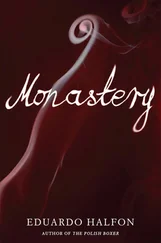Eduardo Halfon - The Polish Boxer
Здесь есть возможность читать онлайн «Eduardo Halfon - The Polish Boxer» весь текст электронной книги совершенно бесплатно (целиком полную версию без сокращений). В некоторых случаях можно слушать аудио, скачать через торрент в формате fb2 и присутствует краткое содержание. Год выпуска: 2012, Издательство: Bellevue Literary Press, Жанр: Современная проза, на английском языке. Описание произведения, (предисловие) а так же отзывы посетителей доступны на портале библиотеки ЛибКат.
- Название:The Polish Boxer
- Автор:
- Издательство:Bellevue Literary Press
- Жанр:
- Год:2012
- ISBN:нет данных
- Рейтинг книги:4 / 5. Голосов: 1
-
Избранное:Добавить в избранное
- Отзывы:
-
Ваша оценка:
- 80
- 1
- 2
- 3
- 4
- 5
The Polish Boxer: краткое содержание, описание и аннотация
Предлагаем к чтению аннотацию, описание, краткое содержание или предисловие (зависит от того, что написал сам автор книги «The Polish Boxer»). Если вы не нашли необходимую информацию о книге — напишите в комментариях, мы постараемся отыскать её.
marks the debut of a major new Latin American voice in English.
The Polish Boxer — читать онлайн бесплатно полную книгу (весь текст) целиком
Ниже представлен текст книги, разбитый по страницам. Система сохранения места последней прочитанной страницы, позволяет с удобством читать онлайн бесплатно книгу «The Polish Boxer», без необходимости каждый раз заново искать на чём Вы остановились. Поставьте закладку, и сможете в любой момент перейти на страницу, на которой закончили чтение.
Интервал:
Закладка:
After a while the passenger from Utah appeared. Harold Lewis. Professor of political science at Brigham Young University. A Mormon, of course. He was in Durham to take part in a conference on Mark Twain. Me too, I told him, and he was obviously surprised to see me in jeans, unshaven, and smoking like some Latino revolutionary. Yes, I told him, I was a university professor as well, but I don’t think he believed me or perhaps he did and just decided to look proud and disdainful. There was something shepherdlike about Lewis, though I’m not even sure what I mean by that. We put our suitcases in the trunk of the limousine, I took a last drag on my cigarette and jumped into the backseat of the sumptuous vehicle with the excitement of a child arriving at an amusement park. The driver told us that we could relax, that we were fifteen minutes from the hotel. Lewis asked me where I was from, and when I told him he raised his eyebrows, but I don’t know why. Gringos. I turned to look out at the immense pine forests that girded the highway, and I remembered what a three- or four-year-old girl once asked when she saw the trees passing by her car window (Why are the trees running backward?), and smiled. Some memories are harmless. Or at least they seem harmless. Look, how tragic, Lewis said, pointing to a dead deer on the road. Real common, said the driver, to see deer run over around these parts. It occurred to me then, as a limousine carrying a Guatemalan and a Mormon rumbled past deer carcasses toward an academic conference on Mark Twain, that I was in the wrong place. Sometimes, just briefly, I forget who I am.
We arrived at the Duke Inn. Out of habit, I gave a few dollars to the driver and found it odd that Lewis didn’t do the same, but I didn’t overthink it either. There were dozens of golfers in the lobby. The click of their spikes on the parquet floor, not to mention the cocktails golfers seem to need after a round of eighteen holes, made me think of my father. Besides being a hotel and conference center, the Duke Inn was also a private golf club. The receptionist, an Indian or Pakistani girl I thought was quite cute, handed me my room key and a folder with instructions and timetables for the days ahead, and I saw with relief that I still had an hour before the welcome dinner. I asked the girl if I could smoke in my room. Looking at her computer screen, she told me no, that she was very sorry but she didn’t have any more smoking rooms. Oh wait a minute, she said with unnecessary excitement, there is one, but I’m afraid it’s for disabled people. That’s no problem, I’m a writer, I wanted to say, but instead I said nothing and she explained to me that the room was designed for guests in wheelchairs. That won’t bother me, I told her. Excuse me a moment, she said, and conferred in whispers with a somewhat effeminate man. Her boss, I assumed. No problem, Mr. Halfon, I just need you to sign here, next to the X, and I signed right away, without even reading the damn thing.
Like some Gulliver, like Alice in an exotic wonderland, or even better, like Snow White in the cottage of the Seven Dwarfs — that’s how I felt. Everything was lower down than usual. The bed, the desk, the TV, the nightstand, the sink, the toilet, even the peephole you looked through to see who was at the door was at waist level. There were rails everywhere and a ramp in the shower. I’m in an invisible circus, I thought, and lit a cigarette. I liked feeling submerged in a more literary environment, or who knows, maybe I just liked feeling bigger.
I took a shower. Wrapped in a towel, I decided to lie down for a minute before going back downstairs, and I dozed without meaning to. I may have dreamed that I was Mark Twain or someone very similar to Mark Twain, sailing down the Mississippi River while writing that I was sailing down the Mississippi River. It was already late when I woke up, but I got ready quickly and arrived in the dining room on the first floor just as they were serving the salads. A young woman greeted me with her eyes and came up to me. Mr. Halfon, I assume. I apologized. Your seat is at that table over there, and she pointed to it. There were sixteen people invited to the conference and, as I would realize later, I was the only foreigner. I introduced myself as I sat down. A young woman named Mary Catherine something — I can’t remember her last name — told me that she taught economics at Yeshiva University in New York. Disconcerted, I asked her if she was Jewish. God no, she said, and I didn’t want to inquire further. A shy young man was working on his doctoral thesis on English poets of the fourteenth or fifteenth century — I can’t remember which and I can’t remember his name. I’m a professor of public choice at Notre Dame, an older woman told me, and I still have no idea what public choice is, despite her having spent more than twenty minutes explaining it to me. To my right, a little old man was taking sips of his zucchini soup in silence. He must be at least ninety, I thought as I watched his hand tremble every time he tried to bring it to his mouth. Hi, I said to him. He put his spoon on the table and glanced up. He looked at me for a while, as though trying to decide whether or not it was worth talking to me. He had bright blue eyes, long fingernails, and a scraggy beard that somehow seemed fake. Did you know that zucchinis are an aphrodisiac? he whispered. Really? I asked. No, he said, but that’s what I tell my wife so she’ll make them a lot. He smiled. But please, kid, he said conspiratorially, patting my forearm, don’t tell her that. He smiled again. I can’t be sure, but I think I grew fond of Joe Krupp straight away, even before I knew who he was or what he did.
After dinner and some pretty dull speeches, they herded us all into another room to drink a few cocktails. Hospitality hour, they called it. I drank a port and, without saying a word to anyone, decided to slip back to my Lilliputian room. I don’t like drinking with intellectuals. When I got there, I saw that there were two little chocolates on the pillow and that the TV was tuned to a channel offering porn films for seven dollars each. I was told once that the average man watches three minutes of a porn film and I wondered whether it was different for women. I still don’t know the answer. I ate both chocolates. I went out onto the little balcony to read a bit about Twain’s life and smoke a cigarette, but I hadn’t even opened the book when my eyelids started to droop. As I stubbed my cigarette out, I thought I could hear sobs coming from the balcony to my right, and peering over cautiously, I managed to see the dark trembling silhouette of a woman sitting with her arms folded. She was whimpering softly, like a baby tired of crying. I suppose she also saw me but it was very dark, so I couldn’t be sure. I thought of asking her if she was all right, if she needed anything. Then I thought it would be inappropriate and just went silently back into my room and fell asleep.
I had a cheese omelette for breakfast with a few cups of coffee — really terrible coffee — and managed to squeeze in a last cigarette, freezing outside with the golfers and the other outcast smokers, before the talks started.
The first session of the conference was about the opening chapters of Huckleberry Finn , and on the whole the contributions weren’t very interesting. That’s what multidisciplinary conferences are like: they have little or no discipline. Each person wrestles the discussion toward their own discipline, including me. Feeling a bit bored, I told them it was years since I’d looked at Twain’s work. Not since I was a kid. But I can no longer just think of him like that, I said, I mean, like a writer of adventure stories for children. Deep down, he’s quixotic. Silence. Right from the first paragraph, I went on, the book is absolutely quixotic or Cervantine. The narrator, in this case Huckleberry Finn, mentions a previous work called The Adventures of Tom Sawyer . And I read aloud: That book was made by Mr. Mark Twain, and he told the truth, mainly. That’s a Cervantine trick, ladies and gentlemen, a self-referential mention of the author. Silence. Some pages later, I continued, while they looked for the page despite my not having said which one it was, Tom Sawyer tells the narrator, Huck Finn, that if he wasn’t so ignorant and had read a book called Don Quixote , he’d know that everything is done by enchantment. Think about the fact that Twain himself quotes Cervantes, I said, and waited in vain for some kind of reaction. Now, why do I think this is so important? I paused like a good professor, until I could feel all fifteen pairs of eyes on me. The relationship between these two characters, between Tom Sawyer and Huck Finn, is very similar to the relationship between Sancho Panza and Don Quixote, a fact proved as the book continues, especially by Tom’s treatment of his friend Huck, and by the ending, and by the attitude that Tom adopts after reading heroic tales. He’s quixotted, I said, and took a sip of tepid water for the pure theatrics of it. Nothing. Silence. Whether it was because they’d never read Don Quixote or because such a heterogeneous group weren’t interested in narrative or even because they hadn’t understood a fucking thing I’d said, my point of view was of little interest to them. In the hours that followed, they continued to talk about slavery and politics and a load of other deeply sterile and not very literary ideas.
Читать дальшеИнтервал:
Закладка:
Похожие книги на «The Polish Boxer»
Представляем Вашему вниманию похожие книги на «The Polish Boxer» списком для выбора. Мы отобрали схожую по названию и смыслу литературу в надежде предоставить читателям больше вариантов отыскать новые, интересные, ещё непрочитанные произведения.
Обсуждение, отзывы о книге «The Polish Boxer» и просто собственные мнения читателей. Оставьте ваши комментарии, напишите, что Вы думаете о произведении, его смысле или главных героях. Укажите что конкретно понравилось, а что нет, и почему Вы так считаете.












